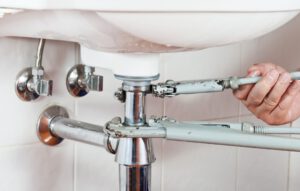Plumbing is a term that applies to the process of conveying fluids in a wide range of applications. It is usually made up of pipes, valves, and other apparatuses. The process is often used in many different kinds of homes, businesses, and other places. In addition, plumbing also includes the use of plumbing fixtures, tanks, and other equipment.
The use of copper in plumbing systems can be a safe and reliable way to protect the health of your family. However, copper pipes can pose some problems. Here are a few things you should know about the material.
First, copper can be used to create electrical equipment. It has also been used in the construction of drinking water pipes. Among the advantages of using copper are its corrosion resistance, its ability to withstand stress, and its malleability. But it is important to remember that copper pipes can corrode, especially when exposed to freezing temperatures.
Copper pipes can also become a source of metal contaminants in the environment. This can happen when air conditioning systems discharge into the Okeover stream.
In the industrial world, copper is the most common plumbing tube. The use of copper can add 4 to 45 percent more copper to your diet. It is important to consider how copper in your home will affect the taste of your water.
There are two types of copper pipes: rigid and soft copper. The former has greater strength and a longer lifespan than the latter. For this reason, it is generally preferred for plumbing applications.
The National Plumbing Code, which regulates the design and installation of residential and commercial plumbing, allows the use of copper. For new installations, it is recommended to use flexible PEX. It is more cost-effective than the thicker grades of copper.
If you choose to install copper pipes, make sure you hire a qualified plumber to do the work. The material can last 50 to 70 years. Depending on the quality of your installation, copper can be a safe and reliable choice.
PVC for plumbing is used for water supply lines, sewage pipes, and irrigation lines. It is a durable material that is lightweight, easy to install, and resistant to chemicals. Aside from its durability, it is also a cost-effective solution to plumbing problems.
When it comes to choosing the right pipe for your needs, it is important to understand how each type of pipe works. Some common types include CPVC and ABS. Before you buy any pipe, you should consult your local plumber to ensure that the product you buy is suitable for your needs.
PVC is a great choice for plumbing because it is inexpensive and lightweight. It is also resistant to corrosion and high pressures. The material is easily recyclable, making it an environmentally friendly option.
While it is lightweight and cost-effective, PVC can degrade when exposed to heat and ultraviolet light. This can make it unsafe to use as an electrical conduit. You should always check with your local building codes before installing any pipe.
You should choose a pipe with a smooth surface. This will reduce friction and help the pipe to flow faster. Aside from being able to withstand high temperatures, PVC is also chemical and abrasion-resistant.
Some types of PVC are designed for plumbing applications, while others are a better choice for electrical conduits. There are different types of PVC that have different thicknesses. The thickness of the walls plays a vital role in the performance of each pipe. You can decide on the best pipe for your project by looking at the chemical compatibility chart.
PVC pipes are also available in different colors. White PVC is often used for water lines in the home. It is also commonly used for pools and spas.
Acrylonitrile butadiene styrene (ABS) and PVC are two of the most common types of plastic pipes in use today. They are lightweight, inexpensive, and highly resistant to corrosion, making them ideal for all kinds of plumbing applications. However, it is important to know the differences between the two types of pipes before choosing one for your next project.
Regardless of which material you choose, the main benefit of plastic pipes is their ability to maintain the temperature of the water. Unlike metal pipes, they will never corrode and will stay flexible enough to prevent condensation from building up in cold water.
